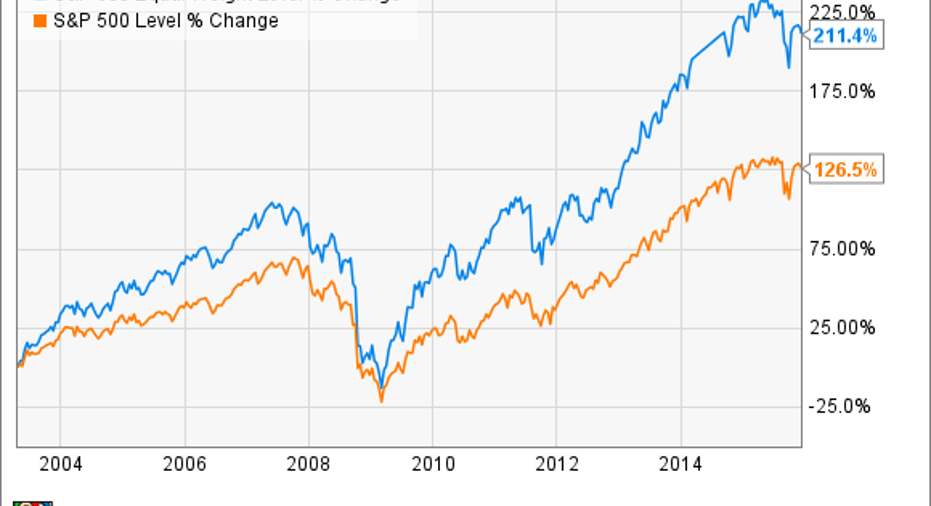The Other S&P 500 Index Youve Never Heard Of

The S&P 500 equal-weight index counts all 500 component stocks equally. Photo: Flickr user Hans Splinter
The S&P 500 is regarded as one of the best indicators of the overall stock market's performance, but many investors don't realize that the components of the S&P 500 are weighted. This means that larger companies have more influence over the index's performance than smaller ones. If you don't want your portfolio to be too dependent on a few large companies, there's another form of the S&P 500 that considers all 500 stocks equally.
The S&P 500 equal-weight indexWhen you turn on the news and see a quote for the S&P 500 (or most other indices), you're looking at a weighted index. In a weighted index, the largest companies make up a proportionally large portion of the index's holdings, and by definition, also make up a larger portion of the holdings of index funds that track them.
As the name implies, the traditional S&P 500 index is made up of 500 stocks. However, the weights of individual components vary dramatically. The largest company in the index, Apple, accounts for 3.67% of the index, and therefore is more influential over the performance of funds that track the index. On the other end of the spectrum, some of the smallest S&P 500 components, such as Fossil Group, account for less than 0.01% of the index's performance.
In other words, if Apple has a particularly good day, it could be enough to drive the S&P higher all by itself. Meanwhile, Fossil could literally triple overnight, and the index would barely budge.
In the S&P 500 equal-weight index, all 500 stocks account for the exact same percentage (0.2%) of the index immediately following a rebalancing. No single company has a disproportionately large or small influence on the index's performance.
As of November 29, 2015.
Why equal weight may be a good alternative Proponents say that equal-weight index funds offer investors an inherent advantage over their weighted counterparts. Index Funds, a company that recently launched a new no-load S&P 500 equal-weight mutual fund to compete against some existing equal-weight investment choices, believes that the equal-weight index is the best-kept secret on Wall Street.
According to Michael G. Willis, Lead Portfolio Manager of Index Funds:
In other words, if Apple's stock price soars during the coming quarter, traditional S&P 500 index funds will be forced to buy additional shares at the new, inflated prices in order to account for Apple's additional weighting. And if many of the index's energy components continue to fall, funds will be forced to unload shares at fire-sale prices -- the exact opposite of "buy low, sell high."
On the other hand, S&P 500 equal-weight funds would be forced to sell Apple shares at the higher price in order to bring their exposure back to even, and would also need to pick up more shares of the worst-performing companies.
Comparing the performanceWhen comparing the performance history of both versions of the S&P 500 index, it's tough to argue against this claim of an advantage. The S&P 500 equal-weight index is relatively new (started in 2003), but the performance history of the two indices since then speaks for itself.
What this means is that a $10,000 investment in the equal-weight version would have grown to more than $31,000 since 2003, while the weighted index would have delivered a respectable, but less impressive $22,600 final value.
RisksThe main risk involved with investing in an S&P 500 equal-weight fund is that you could miss out if the components with higher market caps perform especially well. For example, a good earnings report by Apple can be enough to boost the traditional S&P 500 all by itself, but the equal-weight index doesn't move much because of any one stock.
Of course, this isn't a real "risk," because it works both ways. In other words, if Apple's share price were to plummet, equal-weight investors wouldn't get stung nearly as much as investors holding weighted S&P 500 funds.
If you want to invest in a broad basket of stocks via mutual funds and ETFs, but don't want too much of your money to be dependent on the performance of a few big companies, the S&P 500 equal-weight index may be a good alternative. There are several mutual funds and ETFs that track the equal-weight index, so if you're interested, do some research on the various companies offering them and the fees they charge in order to make the best decision for your investment objectives.
The article The Other S&P 500 Index Youve Never Heard Of originally appeared on Fool.com.
Matthew Frankel has no position in any stocks mentioned. The Motley Fool owns shares of and recommends Apple. The Motley Fool owns shares of ExxonMobil and General Electric Company. The Motley Fool recommends Fossil and Johnson & Johnson. Try any of our Foolish newsletter services free for 30 days. We Fools may not all hold the same opinions, but we all believe that considering a diverse range of insights makes us better investors. The Motley Fool has a disclosure policy.
Copyright 1995 - 2015 The Motley Fool, LLC. All rights reserved. The Motley Fool has a disclosure policy.



















